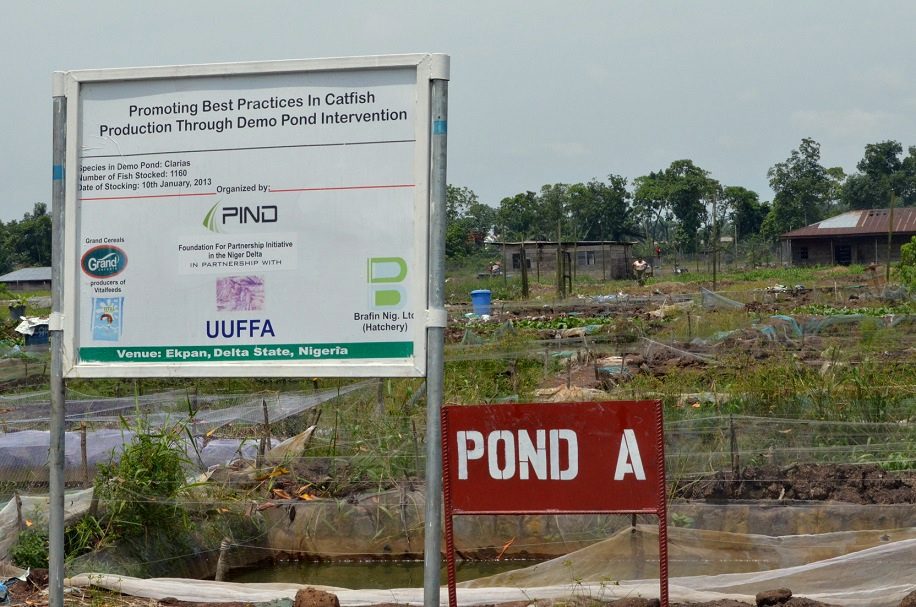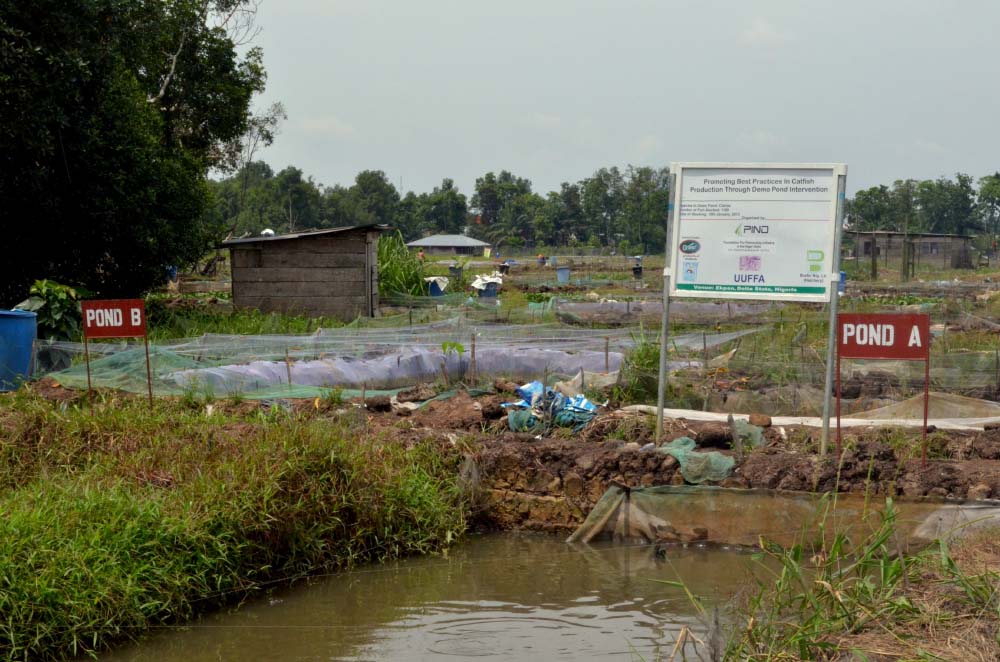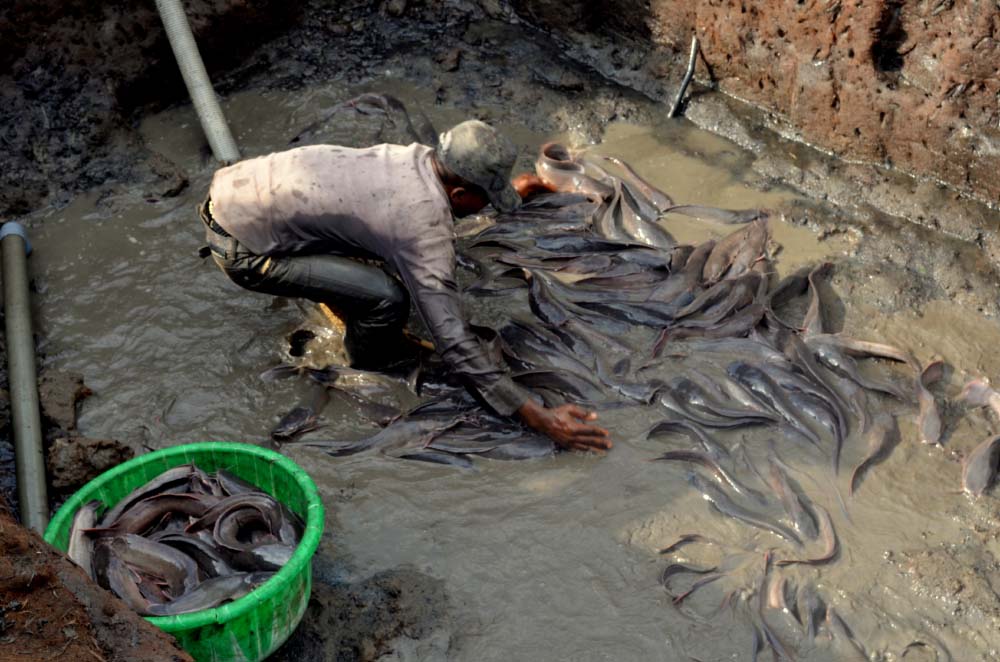Yemi Ogundolire, 36, had always wanted to be a major producer and supplier of catfish in the Niger Delta. In mid-2016, he ventured into fish farming as a business by establishing eight catfish ponds at Akungba in Ondo state.
Though he lacked knowledge of how to run a fish pond, he believed he would succeed in the business. Six months after, he started having challenges with his ponds. At every harvest, he hardly recovered his capital.
“Many times when I stock a pond with 1,000 fish, hardly will I be able to get 600 fish back,” said Ogundolire. “I was just in the business and I had already lost interest.”
“I faced numerous problems ranging from sorting, which is a process of separating the smaller fish from the bigger ones because bigger ones will always feed on the smaller ones. There was a time I wanted to sort; I noticed I had lost 200 catfish. I already lost hope and there was no way I could get back my capital.
He said he didn’t know how to prepare a pond before stocking, including ensuring that water quality was good. Despite the importance of fish in the Niger Delta, fish farmers are still struggling to meet quantity and quality demands.
Mopelola Owoeye, a fish farmer, was also facing some challenges with her ponds. “I was facing water system challenge because I just put my fish inside the water without testing it. I did not know how to calculate the weight and the feeds that are supposed to be given to them at the point of time,” said Owoeye.
In Akwa Ibom state, Linda Okparaeke works with the Daughter of Charity, a convent in Uyo. She loves animals. Five months ago, she decided to start a fish pond, harvest, sell and then use the money to help the less privileged.
She invested the sum of N60, 500 as capital. But before she could harvest the fish, many of them died. “One challenge was that I did not know how to feed them and measure their weight. I regretted it because I did not get my capital. Because of the lack of knowledge and how to take care of the fish, most of them died,” said Okparaeke.
Local fish production in Nigeria is about 1.034 million MT per annum made up of aquaculture, artisanal and inshore fishing. Aquaculture or fish farming accounts for about 30% of total production at around 316,000MT. The Niger Delta accounts for about 30% of fish produced in the country. In the region, the sector is vital to small-scale fish farmers that supply 82% of the region’s domestic fish production.
The sector contributes about 6 percent to the nation’s economy while the country depends on imported fish to meet domestic demand, with total fish imports amounting to about $1.2 billion and exports valued at $284 million in 2013.
Lack of best management practices Ogundolire faces is contributing to his struggle to meet with market demands.
Fish farming is like any other kind of business, says Benedicta Peter-Ugheoke, a fish farmer and an aquaculture service provider. “If you don’t know the technical know-how, you will always run into problems.”
Many farmers have invested wrongly, says Israel Yusuf popularly called Dr. Fish. According to him, a lot of farmers invested in the business without buying the knowledge and at the end of the day, they lose their capital.
“I also found out that several fish farmers do not understand marketing and the middlemen called the fish mammies make more of the profit. So fish farmers don’t have anything to show for their work.”
To address these challenges, Foundation for Partnership Initiatives in the Niger Delta (PIND) in 2012, established the demonstration ponds. The United Ufuoma Fish Farmers’ Association cluster in Delta state was used as the pilot.
In 2014, PIND started visiting other fish clusters in Delta state and from 2015, it expanded to more fish clusters in other Niger Delta states.
On the establishment, Faith Soya, the Market Development Advisor for aquaculture said PIND identified underlying constraints among fish farmers across the Niger Delta region.
“What we found was that there was little awareness about aquaculture farming. Farmers cost of production was high as well as low yield and there was little access to information on aquaculture.”
There were no service providers in the region providing training, information, among others for the farmers. “We had to design the demo pond intervention where we identified key market actors to do a demo for fish farmers,” says Soya.
PIND trained 50 aquaculture service providers of which 20 service providers are actively delivering services to fish farmers across the Niger Delta.
The demo pond training consists of two parts, the technical part where fish farmers are trained on the best management practices and Nigeria Agriculture Enterprise Curriculum (NAEC) package that teaches farmers how to keep records and plan the aquaculture calendar.
A service provider, Dr. Badejo Ayodeji said demo pond was instituted to create a learning platform for farmers so they will see what we are teaching in classrooms are actually practicable, so it is easier for farmers to adopt best management practices as showcased in demo ponds.
Fish farmers go through theoretical training where they are taught everything about fish farming. Then we go ahead with the demo by putting into practice the things they have learnt. “First of all, it begins with pond preparation either with the use of earthen, tarpaulin or concrete ponds, we teach them stocking, liming to kill harmful bacteria. We teach them how to feed and sort,” says Dr. Fish.
It is the pond training that Ogundolire, Owoeye, Okparaeke, and other fish farmers across the Niger Delta received to enable them to increase production and maximize profit. “I had almost quit the business. It was when PIND informed us about the training that I decided to give it a try in July 2017. I came back again into the business. I decided not to quit because there are things I learnt from the training that I had not been doing, which I put into practice,” says Ogundolire.
Owoeye said after the training, her profit increased and she now knows how to manage the farm after the end of every circle. Through PIND, she is now getting fingerlings from a reliable source.
“With this demo pond, I have been courageous enough to pick the pond up again. I started putting the training into practice. It is helping me to know how to treat the pond,” says Okparaeke.
As the major promoter of the demo pond, PIND said since the intervention started in 2012, the project has reached over 11, 000 fish farmers across the Niger Delta. “We have been able to increase the income of over 7,000 fish farmers to about N1.3 billion and facilitated 4000 jobs,” says Soya.
The truth is this, if the business continues this way, says Ogundolire, “And I can be able to stock and sell on a monthly basis.”
PIND’s intervention in the aquaculture sector is yielding results. The farmers are adopting improved practices and are therefore improving their efficiency and increasing income resulting in generation of jobs.







